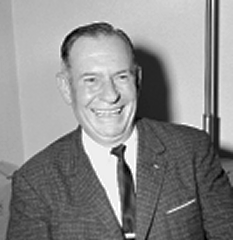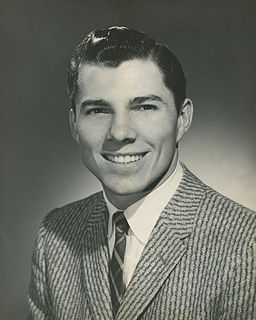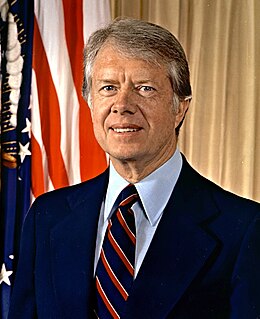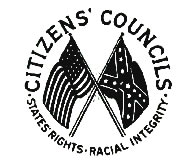
George Corley Wallace Jr. was the 45th Governor of Alabama, a position he occupied for four terms, during which he promoted "low-grade industrial development, low taxes, and trade schools". He sought the United States presidency as a Democrat three times, and once as an American Independent Party candidate, unsuccessfully each time. He is best remembered for his staunch segregationist and populist views. Wallace was known as "the most dangerous racist in America" and notoriously opposed desegregation and supported the policies of "Jim Crow" during the Civil Rights Movement, declaring in his 1963 inaugural address that he stood for "segregation now, segregation tomorrow, segregation forever".

Howard Hollis "Bo" Callaway Sr. was an American politician and businessman from the state of Georgia.

Samuel Marvin Griffin, Sr. was an American politician from the U.S. state of Georgia.

Carl Edward Sanders Sr. was an American attorney and politician who served as the 74th Governor of the state of Georgia from 1963 to 1967.

Jesse Benjamin Stoner Jr. was an American segregationist convicted in 1980 of the 1958 bombing of the Bethel Baptist Church in Birmingham, Alabama.

The Louisiana gubernatorial election of 1963–64 was held in three rounds. The two Democratic Party primaries were held on December 7, 1963 and January 11, 1964. The general election was held on March 3, 1964. The 1964 election saw the election of John McKeithen as governor.

The Louisiana gubernatorial election of 1959–60 was held in two rounds on December 5, 1959, and January 9, 1960. After an election which featured some of the most racially charged campaign rhetoric in Louisiana political history, Jimmie Davis was elected to his second nonconsecutive term as governor after defeating the Republican candidate, Francis Grevemberg, in the general election.

The Alabama gubernatorial election of 1958 was held on November 3, 1958. Incumbent Democrat Jim Folsom was term limited and could not seek a second consecutive term.
Peter Zack Geer was a lawyer and a Democratic politician from the U.S. state of Georgia.

The Arkansas gubernatorial election of November 8, 1966 was the first time since Reconstruction that a member of the Republican Party was elected governor.
Garland Turk Byrd was United States Democratic politician from Georgia, who served as the fourth Lieutenant Governor of Georgia from 1959 to 1963.

Electoral history of Jimmy Carter, 39th President of the United States (1977–1981) and 76th Governor of Georgia (1971–1975).

The 1966 Georgia gubernatorial election was held on November 8, 1966. After an election that exposed divisions within the Georgia Democratic Party, segregationist Democrat Lester Maddox was elected Governor of Georgia by the Georgia General Assembly. The voting also brought future President Jimmy Carter to statewide prominence for the first time.

The 2014 Georgia gubernatorial election took place on November 4, 2014, to elect the Governor of Georgia, concurrently with the election to Georgia's Class II U.S. Senate seat, as well as other elections to the United States Senate in other states and elections to the United States House of Representatives and various state and local elections.
The 1948 Georgia gubernatorial special election was held on November 2, 1948. The election was held as ordered by the Supreme Court of Georgia's decision in 1947 declaring Melvin E. Thompson governor in the wake of The Three Governors Controversy. Herman Talmadge, the son of the winner of the 1946 election, the late Eugene Talmadge, defeated Governor Thompson in the Democratic primary by a margin of 51.8% to 45.1% with three other candidates getting 3.1% of the vote and then proceeded to win the general election with 97.51% of the vote.

The 2018 Georgia gubernatorial election took place on November 6, 2018, concurrently with other statewide and local elections to elect the next governor of the U.S. state of Georgia. Incumbent Republican Governor Nathan Deal was term-limited and thus could not seek re-election to a third consecutive term.

The 1974 Georgia gubernatorial election was held on November 5, 1974. Under Georgia's constitution at the time, incumbent Democratic governor Jimmy Carter was ineligible to serve a second consecutive term. He was elected President of the United States in the 1976 presidential election. George Busbee was elected as the 77th Governor of Georgia.

The 1972 United States Senate election in Georgia took place on November 7, 1972, as one of that year's United States Senate elections. It was held concurrently with the 1972 presidential election. This seat had opened up following the death of Richard B. Russell in 1971. Shortly thereafter, Governor of Georgia Jimmy Carter appointed David H. Gambrell to fill Russell's vacant seat. The Democratic Party nominee was Sam Nunn, a conservative Democrat and member of the Georgia House of Representatives, and the Republican Party nominated Fletcher Thompson, the Representative from the Atlanta-area 5th congressional district of Georgia. In the primary, Nunn emerged victorious from a crowded field of Democratic candidates, including Gambrell and former Georgia Governor Ernest Vandiver. Despite President Richard Nixon defeating George McGovern in Georgia in the presidential election on the same day, Nunn defeated Thompson in the general election 54% to 46%.

The 1970 Idaho gubernatorial election took place on November 3 to elect the Governor of Idaho. Incumbent Republican governor Don Samuelson sought re-election to a second consecutive term as governor. Although he faced a primary challenger, former state senator Dick Smith, he received more than 58 percent of the primary vote, and thus secured the party's re-nomination.

























